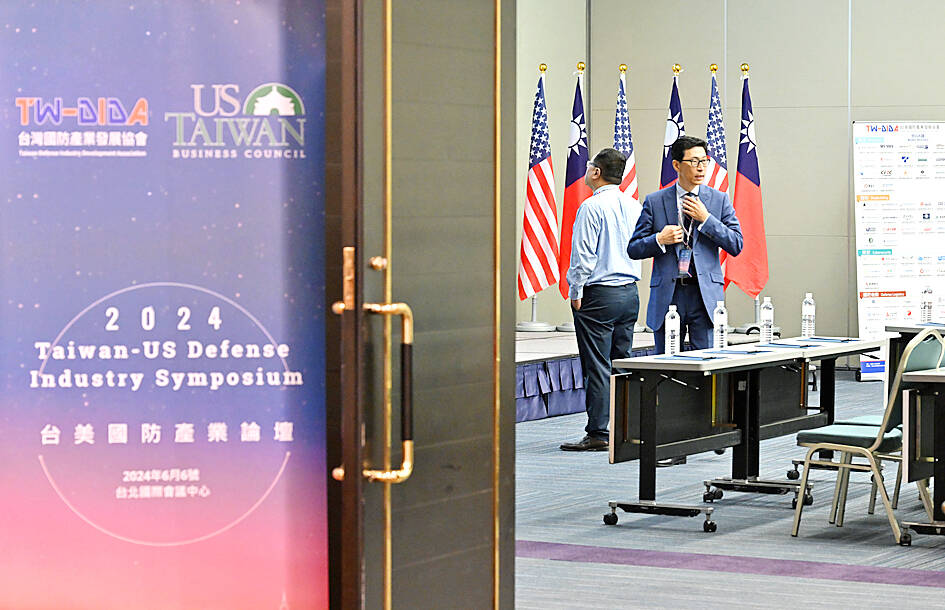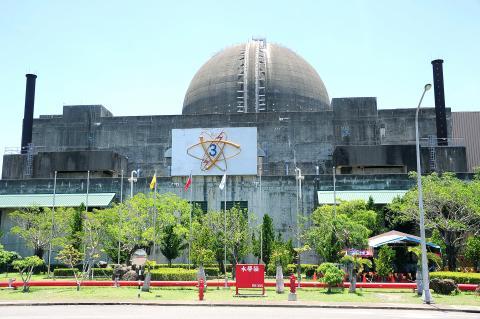There was an atmosphere of “optimistic expectation” at the first day of the Taiwan-US Defense Industry Symposium yesterday, although Taiwanese firms need to do more to enhance security, said Institute for National Defense and Security Research fellow Su Tzu-yun (蘇紫雲), who attended the closed-door event.
The symposium is held in Taiwan during the first half of each year, followed by a symposium in the US in the second half of the year.
The opening ceremony was attended by former US Marine Corps Forces, Pacific commander Steven Rudder and US-Taiwan Business Council president Rupert Hammond-Chambers.

Photo: Tien Yu-hua, Taipei Times
Domestic think tanks and defense vendors attended as well, including the Institute for National Defense and Security Research, National Chungshan Institute of Science and Technology, Aerospace Industrial Development Corp and GEOSAT Aerospace and Technology Inc.
Twenty-seven US defense contractors participated in the event — two more than a year ago — including Lockheed Martin Corp, Raytheon Co, BAE Systems PLC, AeroVironment Inc and Northrop Grumman.
Su said in an interview that the symposium is a semi-official industrial cooperative platform that has operated for more than two decades.
Its content is declared only by the organizer, to protect business secrets and promote mutual trust between the Taiwanese and US governments.
“The opportunity for collaboration between governments is ephemeral,” Su said.
Mutual trust is the cornerstone of industrial collaboration, he added.
Su also said that while Taiwan has the fundamental technologies it needs, its capabilities in corporate security and governance such as confidentiality protection, security management, counterintelligence and anti-infiltration still need to be enhanced.
Taiwan has to conform to international regulations in every aspect, including the Wassenaar Arrangement on Export Controls for Conventional Arms and Dual-Use Good and Technologies, and the Industrial Safety Management Regulations, he said.
That would build mutual trust and allow Taiwan to share relevant techniques in industrial collaboration with other democratic nations, further increasing its own production capacity and defending itself in line with other democratic nations against provocations from Russia and China, he added.

A fugitive in a suspected cosmetic surgery fraud case today returned to Taiwan from Canada, after being wanted for six years. Internet celebrity Su Chen-tuan (蘇陳端), known as Lady Nai Nai (貴婦奈奈), and her former boyfriend, plastic surgeon Paul Huang (黃博健), allegedly defrauded clients and friends of about NT$1 billion (US$30.66 million). Su was put on a wanted list in 2019 when she lived in Toronto, Canada, after failing to respond to subpoenas and arrest warrants from the Taipei District Prosecutors’ Office. Su arrived at Taiwan Taoyuan International Airport at 5am today on an EVA Air flight accompanied by a

An essay competition jointly organized by a local writing society and a publisher affiliated with the Chinese Communist Party (CCP) might have contravened the Act Governing Relations Between the People of the Taiwan Area and the Mainland Area (臺灣地區與大陸地區人民關係條例), the Mainland Affairs Council (MAC) said on Thursday. “In this case, the partner organization is clearly an agency under the CCP’s Fujian Provincial Committee,” MAC Deputy Minister and spokesperson Liang Wen-chieh (梁文傑) said at a news briefing in Taipei. “It also involves bringing Taiwanese students to China with all-expenses-paid arrangements to attend award ceremonies and camps,” Liang said. Those two “characteristics” are typically sufficient

A magnitude 5.9 earthquake that struck about 33km off the coast of Hualien City was the "main shock" in a series of quakes in the area, with aftershocks expected over the next three days, the Central Weather Administration (CWA) said yesterday. Prior to the magnitude 5.9 quake shaking most of Taiwan at 6:53pm yesterday, six other earthquakes stronger than a magnitude of 4, starting with a magnitude 5.5 quake at 6:09pm, occurred in the area. CWA Seismological Center Director Wu Chien-fu (吳健富) confirmed that the quakes were all part of the same series and that the magnitude 5.5 temblor was

Restarting the No. 2 reactor at the Ma-anshan Nuclear Power Plant would take up to 18 months, Minister of Economic Affairs J.W. Kuo (郭智輝) said today. Kuo was answering questions during a meeting of the Legislative Yuan’s Economics Committee, where legislators are considering amendments to the Renewable Energy Development Act (再生能源發展條) amid concerns about the consequences of the Pingtung County reactor’s decommissioning scheduled for May 17. Its decommissioning is to mark the end of Taiwan’s nuclear power production. However, Chinese Nationalist Party (KMT) lawmakers have proposed an amendment to the Nuclear Reactor Facilities Regulation Act (核子反應器設施管制法) that would extend the life of existing